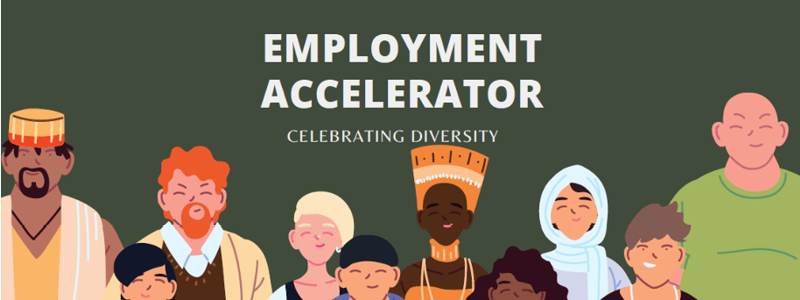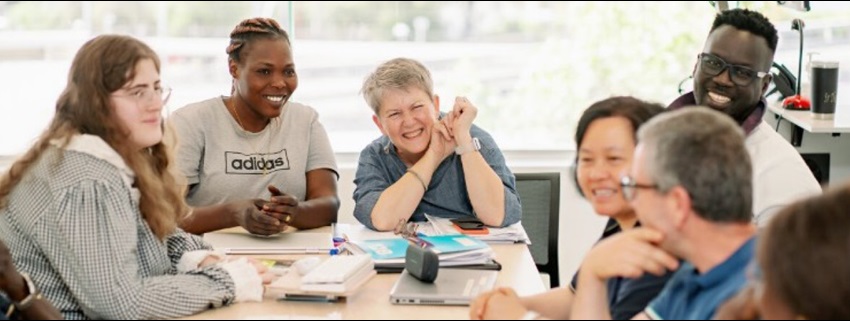SESU research accelerates employment for migrants and refugees

On Wednesday 11 October, 250 migrants and refugees in Western Sydney joined the Employment Accelerator in Blacktown to meet with 12 prospective employers across the health and care, construction, transport and logistics, and retail sectors.
The event sped up the usual job seeking process – by directly giving job seekers opportunities to interview for or express interest in current job vacancies on the day. Job seekers grew their employment networks, received advice on recognition of prior learning and feedback to support them in their employment journeys.
The event was an initiative of the recently established Sydney Greater West CALD and Migrant Working Group, comprising of many organisations across a range of industries in western Sydney – education, social services, and government. ACU has been an active member of the working group, committed to improving employment outcomes for migrants and refugees in western Sydney.
Both the event and the working group were recommendations of the SESU’s community-based research conducted last year in partnership with SydWest Multicultural Services. The full research report can be found here.
What’s coming up?

Join us for the DePaul University, Chicago and ACU bi-annual Conference on Community Engagement, Service Learning and Solidarity.
Learn about innovative and best practice approaches to partnerships between universities and community organisations for societal change.
Among the conference highlights are the:
- Keynote address from Dr María Nieves Tapia, who has an extensive career in service learning and is the founder and Director of the Centro Latinoamericano de Aprendizaje y Servicio Solidario (CLAYSS)
- Student panel presentation led by students from both universities, where they will share with is their experiences of working with community as part of their service learning and community engagement placements
- Plenaries on evaluation and scholarship; community-engaged research; and advocacy, activism and solidarity.
Many of the sessions in Chicago will be available online for those viewing in Australia. Join us from 2-4 November AEDT with free conference registration.
SESU projects in the media
Slavery survivor who became a campaigner wins Freedom Award
ACU students learn how to fight modern slavery
Ten tips to help older people deal with loneliness and isolation
Ageing expert’s advice to beat social isolation
Catholics called to share God’s life-giving message at Brisbane preaching school
Would research benefit your programs or services? The next round of applications to the SESU will open early next year
The SESU will call for EOIs from community organisations again in our 2024 round, due to open in early 2024.
If you work with communities experiencing disadvantage we’d love to hear about the research that matters to you.
You’ll be notified when the call for EOIs opens, but until then read on for information about our application process.
Organisations may put forward applications for one or both types of project:
a) Organisation-specific project: a project that aims to inform, evaluate or enhance one of your programs or services; or
b) Sector project: a project that aims to address a broad or systemic issue that multiple organisations face in the community sector.
The SESU is designed to support projects that can be completed within a period of 12-18 months from their start date. However, if you have a larger project in mind, we recommend you consider segmenting the project into smaller phases and submitting an EOI that focuses on the first phase of the project.
If you are considering submitting an EOI, we encourage you to begin by reading our online FAQs. Here you will find application guidelines—including how EOIs will be assessed—information that will help you determine whether your project is a good fit for the SESU, and tips on submitting a competitive EOI. You will also find information on the kinds of contributions your organisation will be expected to make to the project, which you will be asked about in the EOI form.
How else can ACU support you?
Could ACU provide support to your organisation in areas other than research?
Do you have volunteer opportunities or programs ACU students or staff could support with? Or do you have clients who may not have had or completed a formal education and would like to?
ACU Engagement supports partnerships with community for positive social outcomes. Read on to engage with some of ACU’s flagship community engagement programs.
The power of the creative arts for intergenerational connections: Seniors and young people come together to enjoy the arts through ACU’s community engagement placement program
 The COVID pandemic and its restrictions brought it with it a range of challenges including much isolation and loneliness. ‘Connection Through Creativity’ is a program working against the social impacts of the pandemic. Through the creative arts, it fosters connections for seniors from multicultural communities and young adults.
The COVID pandemic and its restrictions brought it with it a range of challenges including much isolation and loneliness. ‘Connection Through Creativity’ is a program working against the social impacts of the pandemic. Through the creative arts, it fosters connections for seniors from multicultural communities and young adults.
With funding from the NSW government, Good Neighbours Australia and ACU launched a series of art classes for seniors and university students across western Sydney. It champions the therapeutic value of the arts and recognises that profound connections can be made when people are brought together to learn new skills.
‘You have to smile when you paint, see? It helps you to relax and make these brushstrokes smoother,’ said Eterio Herrera, a member of the classes at age 66, while working on his latest artwork.
‘I have never done painting in my life before but I’m enjoying this, it’s something fun to do and I’m learning at the same time’, he said.
Placement opportunities such as these for ACU undergraduate students contribute a unique learning opportunity while giving students the chance to have a direct impact in the wider community.
‘I like learning from their experiences and getting to know what they have learnt from life’, said Ashleigh Stacey, a primary education student at ACU.
Belinda Dona of Good Neighbours said the number of seniors in the program was increasing on a weekly basis.
‘They’re not only getting out of the house, being active and making friends, they’re learning new skills and being an art activity it is easier for them to engage if there is a bit of a language issue,’ she said.
Caroline Allen of ACU said, ‘It is important to us that we develop reciprocal relationships with communities and community service organisations, so together we can work to provide better outcomes for people facing disadvantage or marginalisation’.
‘Community organisations have the opportunity to invite our students to join their organisations through their community engagement placement. Our students come from a range of courses including allied health, social work, arts and humanities and business to name a few’, she said.
Organisations interested in explore placement ideas with ACU should contact the ACU Engagement team.
Our staff give time and expertise to community organisations through our community engagement time release policy
 ACU is committed to providing our staff the opportunity to contribute to their local communities, especially in ways that benefit people experiencing disadvantage or marginalisation. We provide staff the option to dedicate five of their workdays in support of non-profit and community service organisations.
ACU is committed to providing our staff the opportunity to contribute to their local communities, especially in ways that benefit people experiencing disadvantage or marginalisation. We provide staff the option to dedicate five of their workdays in support of non-profit and community service organisations.
To discuss the support you need, please contact the ACU Engagement team.
Become involved in the Clemente Australia program and support learners within our communities who are pursuing a liberal arts education

Learning and teaching partnerships, Clemente Australia, 2023
The Clemente Australia program is celebrating 20 years of participation, partnership and learner success this year, providing opportunities for people within our communities to engage in university-level liberal arts education to empower their lives and transform their communities. Now recruiting for 2024, join us in one of our Clemente Australia programs in Ballarat, Blacktown, Brisbane, Canberra, Melbourne or Surry Hills.
Join us as a volunteer: A key to the success of the Clemente program is the involvement of our volunteer learning partners who help students to achieve their learning goals. Both the students and the volunteers learn from their experiences and interactions with one another. Clemente learning partners come from a variety of backgrounds—education, community and business. Learning partners bring with them diverse, rich life and career experiences and skills. Become a learning partner.
Join us in partnership to support and facilitate our programs: Critical to the Clemente Australia program are our long term, sustainable and reciprocal partnerships with community organisations. Together, we work to build program reach and meet student needs. ACU invites community, government and business organisations as our partners through contributions of time, talent, influence, and/or resources. Partner with Clemente.
Clemente Australia acknowledges with thanks, its current partners- CatholicCare Victoria, The City of Ballarat, The Ballarat Foundation, Federation University, St Vincent de Paul Society Canberra and Goulburn, St Vincent de Paul Society Queensland, Sisters of Mercy, Micah Projects, City of Yarra and Mission Australia, Surry Hills Sydney
Join us as a student: Clemente Australia encourages people aged 18 – 80 to restart their education through the program. We welcome students from all backgrounds and communities who have experienced barriers/challenges in their lives that have interrupted their education or prevented them from achieving their learning goals. If you would like to refer a student or to discuss student recruitment please contact the Clemente team who will connect you with a program near you.
“Before starting Clemente, I had lost faith in myself and my abilities. This course helped me gain self-confidence again. The critical thinking skills I learn really helped me to deal with some of my anxiety issues in life.” (Clemente student)
If you are interested in learning more about the Clemente Program at ACU either as a Partner, a Volunteer, a Learning Partner or as a student, please contact the Clemente team.
Get the SESU newsletter direct to your inbox











 The COVID pandemic and its restrictions brought it with it a range of challenges including much isolation and loneliness. ‘Connection Through Creativity’ is a program working against the social impacts of the pandemic. Through the creative arts, it fosters connections for seniors from multicultural communities and young adults.
The COVID pandemic and its restrictions brought it with it a range of challenges including much isolation and loneliness. ‘Connection Through Creativity’ is a program working against the social impacts of the pandemic. Through the creative arts, it fosters connections for seniors from multicultural communities and young adults.
 ACU is committed to providing our staff the opportunity to contribute to their local communities, especially in ways that benefit people experiencing disadvantage or marginalisation. We provide staff the option to dedicate five of their workdays in support of non-profit and community service organisations.
ACU is committed to providing our staff the opportunity to contribute to their local communities, especially in ways that benefit people experiencing disadvantage or marginalisation. We provide staff the option to dedicate five of their workdays in support of non-profit and community service organisations.
